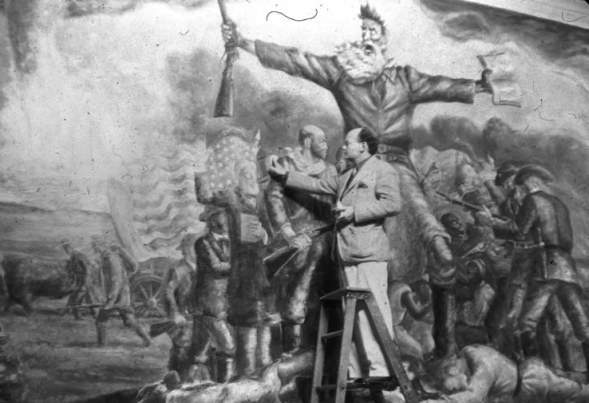Annette Hope Billings is an award-winning writer and actress who has called Topeka home since early childhood.
During a recent visit to Fort Scott, Kansas, I learned the multi-talented, award-winning Kansan whom I thought was named Gordon Parks was actually named Gordon Roger Alexander Buchanan Parks. It seems fitting that a man of many talents would have many names, and nothing but an impressive name suited such an impressive person. (And speaking of impressive, I smile to think that his mother—who had already named his 14 older siblings—still had such a stock of names left.)
Parks was born into that large family in Fort Scott in 1912. Given the era, I wonder if his mother gave him extra names to offset the things she knew the world would attempt to deny him. He was a black boy born less than five decades after the Civil War. One biographer wrote that Parks “faced aggressive discrimination as a child,” which seems to be a polite way of saying “as a black child he feared for his well-being every minute of every day.”
It was Parks’ photography for Life magazine I recall first learning about in school. I later discovered he was also a writer, composer, poet, photojournalist, film director, producer, and screenwriter. The 1969 film, The Learning Tree (based on his 1963 semi-autobiographical novel), remains a favorite. Parks wrote, directed, and produced the film, which was shot in Fort Scott. Equally memorable was the debut of his 1971 film, Shaft. It was released my freshman year of high school. Seeing the movie was a non-negotiable prerequisite for being considered cool in my circle. Both The Learning Tree and Shaft bolstered my determination to be a writer.

My recent trip to Fort Scott was my first visit, and I wondered how experiencing Parks’ hometown would affect me as a fellow writer and Kansan. I was not disappointed. My first stop was the Gordon Parks Museum, and it should be on every Kansan’s “must see” list. I left the museum richer just for having been there and having listened to everything the expert curator had to say about Parks. The museum itself does an excellent job of presenting both the breadth and depth of his life, and much of what is displayed speaks to Parks’ commitment to documenting racism and poverty. It was clear his fame never diminished his passion for social justice. The museum experience reminded me of the power of arts and artists to effect change. There is no shortage of poems about the pretty aspects of life, but the presentation of Parks’ life affirmed my desire to write about the hard truths—those truths that remind us social justice is not just desirable, but mandatory.
After leaving the museum, I drove through parts of Fort Scott, including neighborhoods, Main Street, historic Fort Scott and, finally, the cemetery that holds Parks’ grave. I found his headstone, distinct but not monumental. A person unfamiliar with Parks wouldn’t know an important person was buried there.
I left Fort Scott feeling more deeply connected and committed to writing. I reveled in knowing the people, the air and the buildings were not unlike what Gordon Parks knew. Certainly there were different people and buildings that had come after him, but my sense was the feel of the town that Parks had described and conveyed in his work had not changed.
I loved that Parks was a self-taught artist who did not allow difficult circumstances to stifle him. He was fearless in his willingness to head toward new horizons. In his words, “There’s another horizon out there, one more horizon that you have to make for yourself and let other people discover it, and someone else will take it further on, you know.”
Leaving Fort Scott on an unusually warm winter day, I felt hopeful as I headed toward my next horizon.
--Annette Hope Billings
GORDON PARKS MUSEUM
2108 S Horton St, Fort Scott Community College
Fort Scott | (800) 874-3722
Iconic photographs, personal artifacts and exhibits in this museum focus on the life and work of this internationally known, self-taught photographer, filmmaker, author and composer. The museum hosts a Gordon Parks Celebration each fall.
GORDON PARKS GRAVESITE
914 215th St, Evergreen Cemetery
Fort Scott | (620) 223-2879
A formerly segregated cemetery that held the graves of Parks’ parents, Evergreen was revitalized in part because of communication between Parks and the city’s then-mayor before Parks died in 2004. A monument with a poem by Parks was added in 2007.
Read more about Gordon Parks
Honoring Gordon Parks
Ways to Stay Connected
Read more about Kansas History
View ALlBlack History Trail of Geary County
Mar 08, 2024Jim Sands, President of the Black History Trail of Geary County / Photography by Nick Krug A county… Read More
Quindaro: A Great, Nearly Lost City of Free Peoples
Mar 07, 2024Photography by Andrea LaRayne Etzel & Carter Gaskins Quindaro was an abolitionist frontier city… Read More
From the Archives: Remembering John Steuart Curry
Jan 15, 2024Editor's Note: This article was originally published in the winter of 1992 by Don Lambert… Read More
From the Archives: Birth of the Helicopter
Jan 08, 2024Editor’s Note This article was originally featured in the winter issue of 1983 by Joan L… Read More
From the Archives: Kansas Outlaws
Oct 05, 2023The Sunflower State is known for its famous lawmen—but its infamous villains are legendary as… Read More










